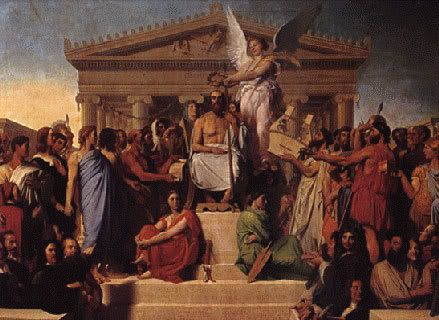
Now, finally, I’m going to tell you more about the Homerids—the Homeric bards (the “singers of tales”). For a very long time, indeed since the days of the ancient Greeks who lived in the civilization that emerged from the Dark Age between about 1200 BCE and about 800 BCE, people thought that there had been a poet named Homer who had personally written down his masterworks, the epics called the Iliad and the Odyssey. (The ancient Greeks also knew several other works that they thought were also by Homer, many of which they were already starting to have arguments about, on the matter of whether they really were actually by him; these works are now almost entirely lost, not least because they were acknowledged from very ancient times not to be very good.)
But, as we’ve known for certain since the 1950’s, thanks above all to the work of the classicists Milman Parry and Albert Lord, this very ancient conventional wisdom was wrong, and ancient Greek epic actually emerged from an oral tradition of recomposition of traditional stories according to a highly-developed system of bardic improvisation. There’s very good reason to doubt that there ever was a single bard named “Homer”: it seems much more likely that we should speak instead of “the Homers,” or perhaps “the Homerids”—that is, the guild of bards who made a living singing these tales to admiring audiences.
There are as many ways to construct the history of how the ancient Greeks got the notion of a blind poet named Homer as there are people who have studied the matter, of course. My own view goes like this. The word homerides in the oldest form of Greek looks awfully like it means “a guy who puts it together.” That word, which is best put into English as “Homerid” would look to later Greeks like it really meant “son of a guy named Homer.” We know that there was some sort of professional group called the Homerids during the classical period, who had some sort of jurisdiction over deciding who was good at reciting Homer. So I’m convinced by the current state of our evidence that the idea of a man named Homer arose from a misinterpretation of the ancient title for a singer-of-tales, Homerid.
We can know almost nothing for sure about these bards, but we do have precious evidence in the epics themselves at least about how they hoped they would be seen. Most importantly, the Homeric Odyssey has two characters who are bards (the Greek word, aoidos, comes from the verb “sing,” and just means “singer”) themselves. These characters are, as one might imagine, very popular with their audiences, although one of them ends up in hot water for pleasing the wrong audience (don’t worry, he gets acquitted on the same grounds we gamers acquit game developers every day, that he was just trying to please his target market).
For now, the most important thing I want to point out about the bards of the Odyssey is that that the (real) bards who sang that epic into the form in which we have it emphatically depict themselves through those (fictional) bards both as singing the song the way they want to sing it and as responding to their audiences’ requests. Here’s a passage about Phemius, the bard who sticks around Odysseus’ palace while Odysseus is away in Troy and on his homeward-bound travels. The speaker is Telemachus, Odysseus’ son; he’s telling his mother Penelope not to criticize Phemius for singing a song that makes her sad:
Why do you begrudge this fine singer, mother, his pleasing himself as hisPhemius is singing the song he wants to sing, because he knows his audience will like it; his audience are the suitors who are trying to get Penelope to marry one of them, and it makes the suitors happy to think that Odysseus, like the other Achaeans, is going to have a nasty homecoming. The song, that is, is about them in a very important sense, and, the bard of the Odyssey clearly thinks, that makes them pay Phemius better—or at least makes them keep him around.
mind directs? The singers are not responsible—Zeus must be responsible,
giving to mortal men, everyone, in the way that he wants.
There is nothing bad about singing the sad homecoming of the Greeks.
People certainly always give more favor to the song
that goes about most recently among its hearers.
But there’s another implication of this passage that follows on from discussing how the bard chose his stories, together with our understanding of bardic improvisation. Because every performance of an epic song was newly improvised, the bard’s re-creation of the epic occurred in an interaction with his audience on the one hand, and the material of the epic tradition on the other: the bard was a sort of interactive conduit between the two. If you remember my story about the herdsman-turned-bard, you can see that that figure—the young man who starts in the audience and then becomes a singer himself—first interacts with the story through the bard, then (when he is the bard) gets to please himself, as long as he keeps his audience happy.
Obviously, I’m saying that that interaction is like the celebrated interactivity of the experience of playing an adventure video game—that the herdsman-turned-bard is like the gamer. We’ll take the ancient material a step farther, though, before we go back to video gaming. Next time: Iliad 9 and the choice of Achilles—a Bioshock moment?
